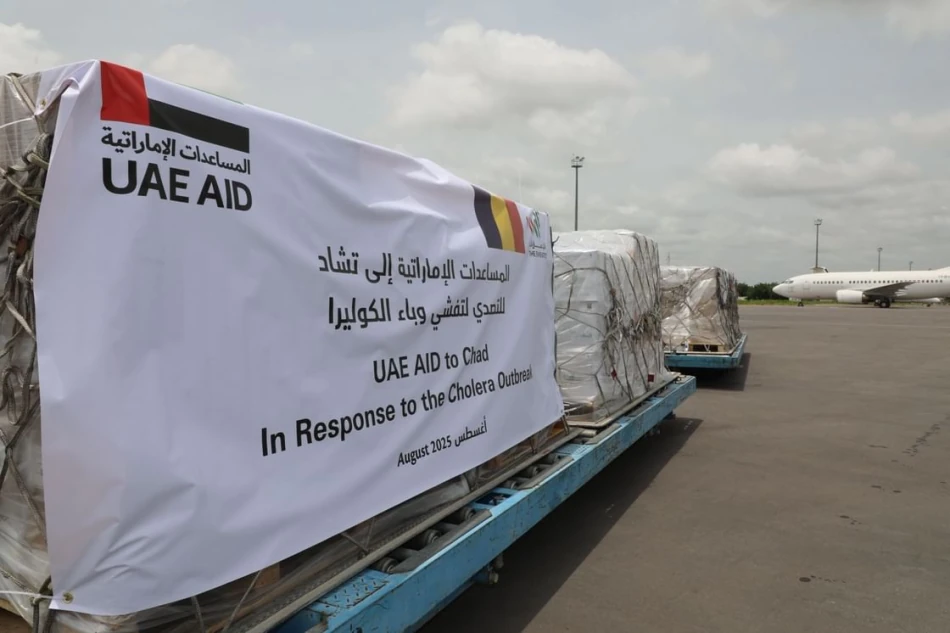
Chadian Government Receives Emirati Medical Aid to Combat Cholera Outbreak
UAE Delivers 30 Tons of Medical Aid to Chad as Cholera Outbreak Spreads Across Africa
The United Arab Emirates has dispatched 30 tons of emergency medical supplies and medicines to Chad to combat a spreading cholera outbreak, marking another significant humanitarian intervention as the disease threatens multiple African nations. The aid delivery underscores the UAE's expanding soft power strategy across Africa while addressing a public health crisis that the World Health Organization has flagged as a growing regional concern.
Emergency Response to Regional Health Crisis
The medical supplies were delivered to N'Djamena International Airport, where Chad's Minister of Social Work, Solidarity and Humanitarian Affairs, Zahra Mohamed Issa, received the shipment alongside Emirati and Chadian officials. The emergency aid package represents a direct response to cholera's rapid spread across Chad, a landlocked nation already grappling with limited healthcare infrastructure.
Minister Issa emphasized that the supplies would strengthen government medical teams' efforts to contain the outbreak, describing cholera as a persistent source of concern for the Chadian population nationwide. The government has committed to distributing the aid transparently across different regions to ensure adequate treatment coverage for patients of all age groups.
UAE's Strategic Humanitarian Diplomacy
Rashid Saeed Al Shamsi, UAE Ambassador to Chad, positioned the aid delivery within the framework of strengthening bilateral relations while highlighting the UAE's broader humanitarian role across Africa. This intervention aligns with the UAE's established pattern of leveraging humanitarian assistance to build diplomatic influence, particularly in strategically important African markets.
Building African Partnerships Through Health Diplomacy
The UAE's medical aid to Chad reflects a calculated approach to African engagement that extends beyond traditional economic partnerships. Similar to China's health diplomacy initiatives during the COVID-19 pandemic, the UAE is positioning itself as a reliable partner during health emergencies, potentially opening doors for future trade and investment opportunities in Chad's emerging sectors.
WHO Warning Signals Regional Epidemic Risk
The World Health Organization recently issued warnings about cholera outbreaks across several African countries, including Chad, signaling a potential regional health crisis. Cholera, a waterborne disease that spreads rapidly in areas with poor sanitation, poses particular risks in nations with limited healthcare infrastructure and clean water access.
Chad's vulnerability to cholera outbreaks stems from structural challenges including inadequate water treatment facilities, limited medical resources, and geographic isolation that complicates rapid response efforts. The country's landlocked position makes external medical assistance particularly valuable during health emergencies.
Implications for Regional Stability
The cholera outbreak in Chad carries broader implications for regional stability in Central Africa. Disease outbreaks can strain government resources, disrupt economic activity, and create refugee flows that affect neighboring countries. The UAE's rapid response demonstrates recognition that health crises in strategically located nations like Chad can have cascading effects across the region.
Economic Considerations
For international investors and regional governments, the cholera outbreak highlights the ongoing infrastructure gaps that create both risks and opportunities across Africa. Countries that can effectively respond to health crises through improved healthcare systems and international partnerships may prove more attractive for long-term investment, while those struggling with basic public health challenges face continued economic vulnerabilities.
The UAE's intervention also signals its commitment to maintaining stability in regions where it has growing economic interests, suggesting that similar humanitarian responses may become more frequent as Gulf states expand their African engagement strategies.
Most Viewed News

 Sara Khaled
Sara Khaled






